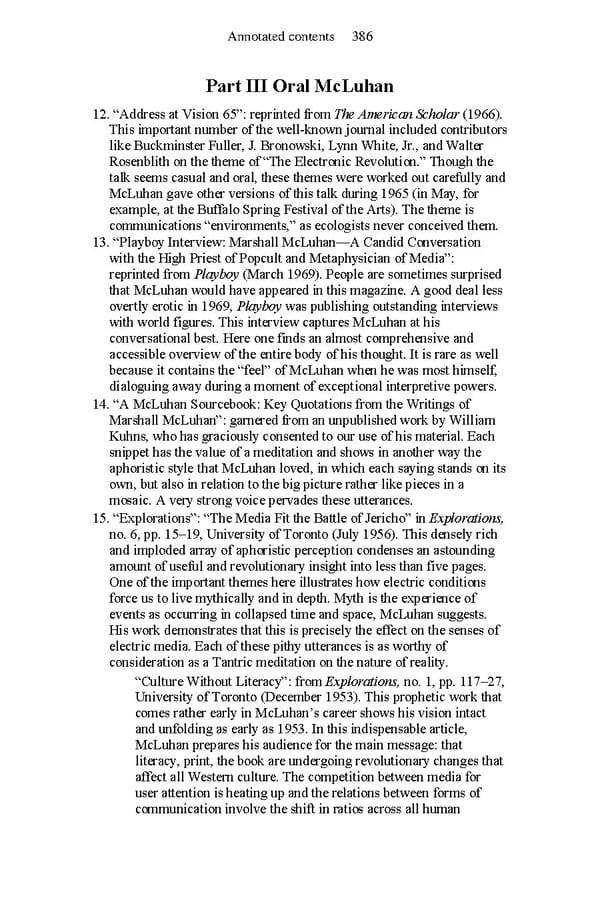Annotated contents 386 Part III Oral McLuhan 12. “Address at Vision 65”: reprinted from The American Scholar (1966). This important number of the well-known journal included contributors like Buckminster Fuller, J. Bronowski, Lynn White, Jr., and Walter Rosenblith on the theme of “The Electronic Revolution.” Though the talk seems casual and oral, these themes were worked out carefully and McLuhan gave other versions of this talk during 1965 (in May, for example, at the Buffalo Spring Festival of the Arts). The theme is communications “environments,” as ecologists never conceived them. 13. “Playboy Interview: Marshall McLuhan—A Candid Conversation with the High Priest of Popcult and Metaphysician of Media”: reprinted from Playboy (March 1969). People are sometimes surprised that McLuhan would have appeared in this magazine. A good deal less overtly erotic in 1969, Playboy was publishing outstanding interviews with world figures. This interview captures McLuhan at his conversational best. Here one finds an almost comprehensive and accessible overview of the entire body of his thought. It is rare as well because it contains the “feel” of McLuhan when he was most himself, dialoguing away during a moment of exceptional interpretive powers. 14. “A McLuhan Sourcebook: Key Quotations from the Writings of Marshall McLuhan”: garnered from an unpublished work by William Kuhns, who has graciously consented to our use of his material. Each snippet has the value of a meditation and shows in another way the aphoristic style that McLuhan loved, in which each saying stands on its own, but also in relation to the big picture rather like pieces in a mosaic. A very strong voice pervades these utterances. 15. “Explorations”: “The Media Fit the Battle of Jericho” in Explorations, no. 6, pp. 15–19, University of Toronto (July 1956). This densely rich and imploded array of aphoristic perception condenses an astounding amount of useful and revolutionary insight into less than five pages. One of the important themes here illustrates how electric conditions force us to live mythically and in depth. Myth is the experience of events as occurring in collapsed time and space, McLuhan suggests. His work demonstrates that this is precisely the effect on the senses of electric media. Each of these pithy utterances is as worthy of consideration as a Tantric meditation on the nature of reality. “Culture Without Literacy”: from Explorations, no. 1, pp. 117–27, University of Toronto (December 1953). This prophetic work that comes rather early in McLuhan’s career shows his vision intact and unfolding as early as 1953. In this indispensable article, McLuhan prepares his audience for the main message: that literacy, print, the book are undergoing revolutionary changes that affect all Western culture. The competition between media for user attention is heating up and the relations between forms of communication involve the shift in ratios across all human
 Essential McLuhan Page 392 Page 394
Essential McLuhan Page 392 Page 394